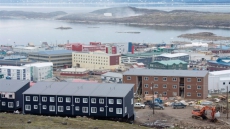VANCOUVER - From Simon Fraser University in Burnaby, B.C., to Cape Breton, N.S., two words — Quebec sovereignty — hover like a spectre over the debate on Scottish independence.
As the historic Sept. 18 vote approaches, Caledonian-Canadians are divided not only about breaking Scotland's centuries-old bond with England but about the parallels between the Quebec and Scottish referendums.
Twice, first in 1980 and then in 1995, Quebecers voted not to break up Canada. When their day comes, Scots will be asked, "Should Scotland be an independent country?"
"We're Canadians so we automatically see it in terms of our own kind of issues and concerns, which makes sense," said Leith Davis, a professor of English at Simon Fraser University and director of the Centre for Scottish Studies. "But I think we just have to be a little careful to see the differences."
Interest in the Scottish vote among Canadians is natural, considering the deep ties between the nations.
After the Highland Clearances in the 18th and 19th centuries, Scots moved from Britain and settled in regions like Cape Breton; They migrated west, many served as governors and mayors; Scots formed highland infantry regiments that still operate in Canadian military today; Glasgow-born Sir John A. Macdonald was Canada's first prime minister.
The historical and cultural links are not lost on Ashley MacIsaac, the multi Juno-award winning Celtic fiddler from Creignish, N.S., who traces some of his ancestors back to the highlands before the clearances.
Despite his family's history, MacIsaac said he's against the idea of referendums because Canada has faced several and they tend to pick apart old wounds, rather than heal them.
"I am all for the United Kingdom," he said. "I am all for the concept that I think Canada represents, which is one of different groups that have fought over different times coming together and showing the world that it can happen versus the dismantling of agreements between different nations."
In Toronto, Rory "Gus" Sinclair, first vice-president of his city's St. Andrew's Society, said he'd vote No if he had the opportunity.
"I believe that Quebec is better off in Canada, and if I believe that, and I do, and I believe Canada is certainly better off with Quebec in it, then it would be hypocritical of me to say, 'well, listen, let's do independence for Scotland over there but not over here,'" said Sinclair.
Scottish culture will survive, regardless of a referendum, he said, noting there's a huge Scottish presence worldwide.
Sinclair, who calls himself a proud Canadian and returns to Clan gatherings in Scotland, said he is frequently asked to play his bagpipes in non-Scottish parades and even at Italian weddings.
Peter McAuslan, a member of the Montreal Scottish community, past president of his city's St. Andrews Society, spokesman for the local highland games and past brewery owner, said he'd rather not comment on how he'd vote, and Quebec is a big reason why.
"I used to find it really offensive when people would speak from outside of Canada about the internal issues here so it's up to the Scots," he said. "I'm not a Scot. I'm a Canadian, and I have a great deal of respect for the process they're going through."
McAuslan said he has no qualms about talking about the differences between the referendums.
Quebec's government is in a stronger position than the Scottish government when it comes to making decisions, he said.
Language was a focus of Quebec sovereignty, he added, and that's fanned nationalism. Sovereignty's umbrella has been larger in Scotland, where economics and self-control appear to be bigger issues than culture, he added.
Few people may be better able to grasp the similarities and differences between the Quebec and Scottish referendums than Harry McGrath, a Glasgow-born dual citizen who has lived half his life in Scotland and half in Canada.
McGrath, once the co-ordinator for SFU's Centre of Scottish Studies, said Canada's reinvention under prime minister Pierre Trudeau is more relevant to the current debate on Scottish independence than the parallels of Quebec sovereignty.
"I'm more or less a minority of one on this because everybody else gets whooped up on Quebec and thinks that, you know, Quebec must be the great parallel to what's happening in Scotland," he said. "I don't see it that way at all."
He said when he read the Scottish government's white paper on sovereignty, he felt as if it were Groundhog Day.
During the 1970s, Canada became multicultural, welcomed immigrants, emphasized health and welfare, demilitarized and rid itself of nuclear weapons, he added, and many of the same things are now happening in Scotland.
The similarities between Scotland and Canada even helped him decide on how he'll cast his ballot.
"I'm going to vote Yes, and the reason I'm going to vote Yes, I suppose, is fairly unusual because I'm such a lover of Canada, and what I see happening here is the kind of same reinvention that Canada did from about the '70s onward."
Back in B.C., sovereignty is an issue in the Caledonian community, and Davis said she'd vote Yes, too.
"The biggest reason I would vote Yes is because I think it really makes sense for a nation to decide on its own laws and to decide how to make those laws and what direction that it wants to go," she said.
Scotland has not been well represented in Britain's parliament, there's a feeling of disenfranchisement, and it's now time for Scotland to grow up, she said.
Doing so will give England a chance to think about what it means to be English, added Davis.




